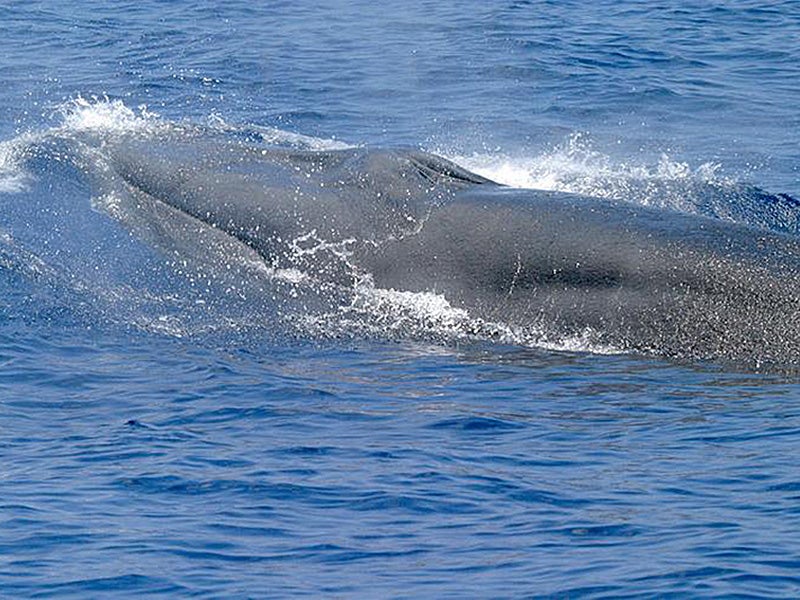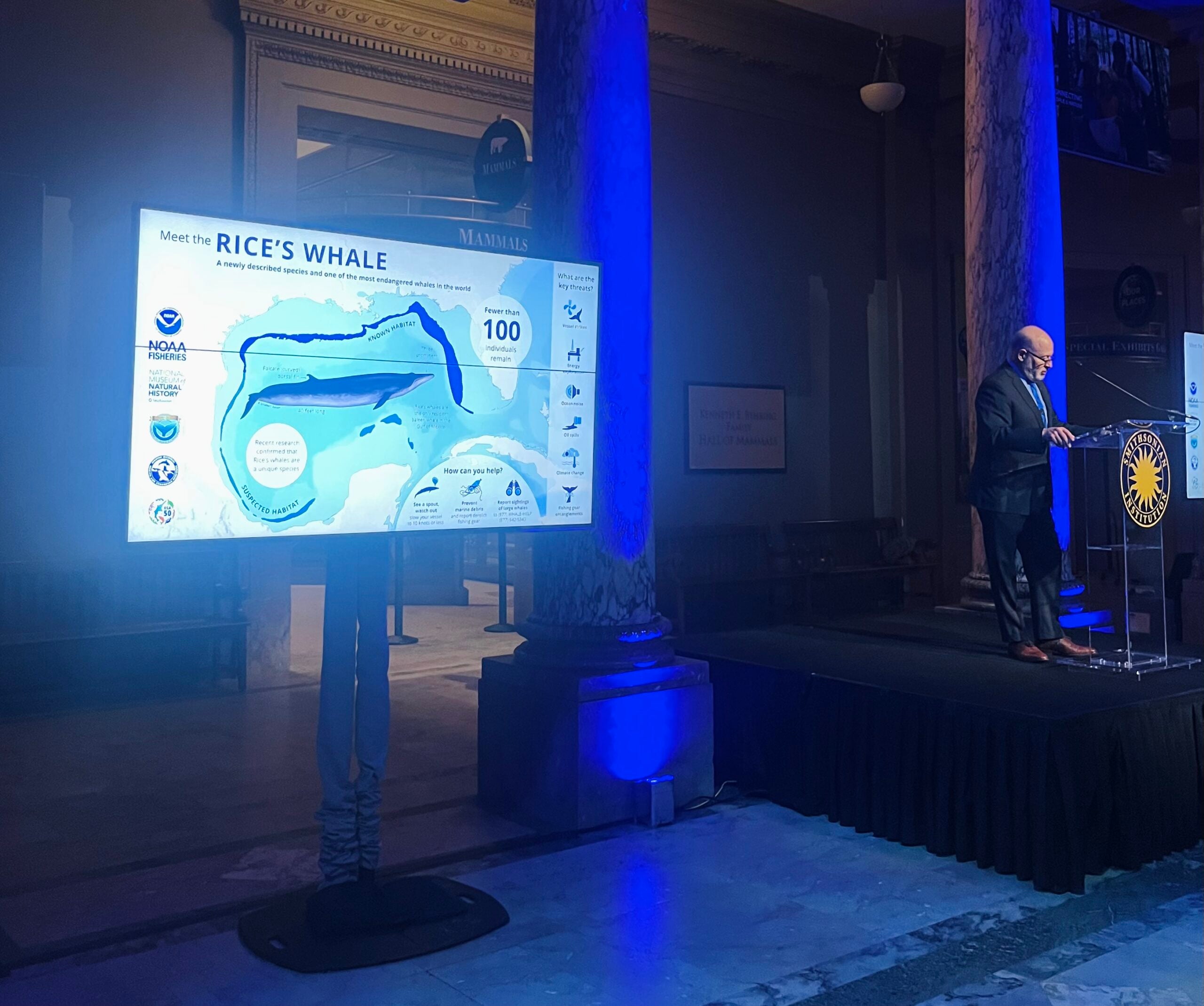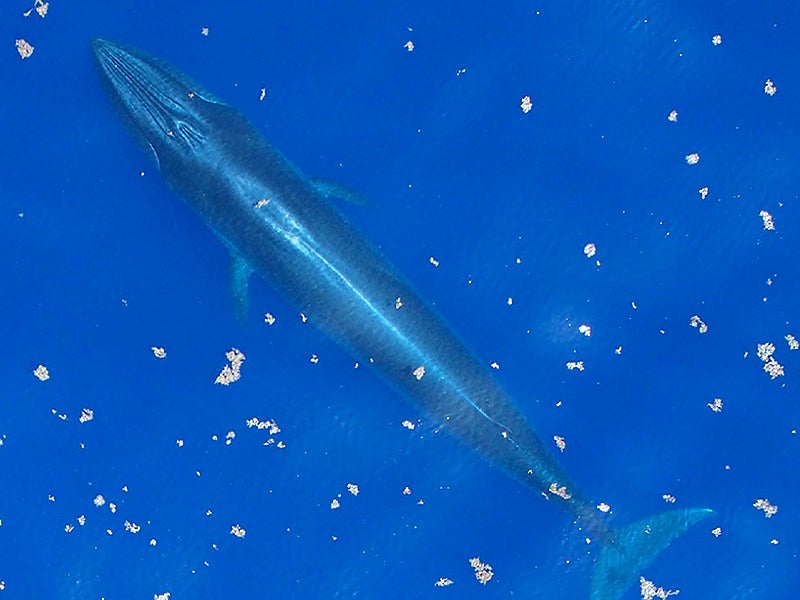Fossil Fuel-Friendly Ruling Endangers the Last Gulf of Mexico Whales
As scientists gathered at the Smithsonian to discuss the significance of the new-to-science whale, a court decision has further jeopardized the already critically endangered whale.

This page was published 2 years ago. Find the latest on Earthjustice’s work.
There’s only one whale species that lives only in American waters. It’s the new-to-science Gulf of Mexico Rice’s whale (also called “Rice’s whale”), found congregating off the coast of Pensacola, Florida and traveling to find food, mates, and raise their young as far as the waters of Texas, Alabama, Mississippi, and Louisiana.
It is also one of the rarest species on the planet: Only about 51 Rice’s whales are left. The species is so endangered, scientists have said, that losing even one breeding female could spur the first human-caused extinction of a whale species in recorded history. Vessel strikes, oil-and-gas industrial activities, and oil spills are the greatest threats to the species.
This week, government officials, scientists, journalists, and members of the public gathered at the Smithsonian for a symposium focused on the new-to-science whale, discovered in 2021. And the directors of the National Oceanographic and Atmospheric Administration (NOAA) Fisheries, the Marine Mammal Commission, and U.S. Fish and Wildlife Services honored the highly endangered species at a reception at the National Museum of Natural History.
One night earlier, those working to protect the rare whale got disappointing news: the Fifth Circuit of Appeals ordered the Department of Interior to remove baseline protections for the Rice’s whale from an upcoming offshore oil sale in the Gulf, granting the demands of the oil industry despite what it could mean for this majestic species.

Under Secretary of Commerce for Oceans and Atmosphere & NOAA Administrator Richard Spinrad speaks at the Smithsonian’s symposium on the Gulf of Mexico Rice’s whale on November 16, 2023. (Jackson Chiappinelli / Earthjustice)
Last year, a group of 100 scientists warned the Biden administration that oil-and-gas activity in the Gulf represents a “clear, existential threat to the whale’s survival.” Nearly one in five Rice’s whales were killed in the wake of the 2010 Deepwater Horizon spill. As National Public Radio reports, vessel strikes and oil spills loom as constant hazards.
Earthjustice and clients are making numerous attempts to defend the Rice’s whale. We filed a petition calling for NOAA to set vessel speed limits in the whale’s habitat to limit noise and ship strikes. Unfortunately, NOAA rejected the petition. We also sued federal agencies in 2020, arguing that the Trump administration violated the Endangered Species Act by failing to adequately protect the imperiled whales. A settlement agreement stemming from that lawsuit excluded Rice’s whale habitat from upcoming oil-and-gas drilling lease sales. A massive 73-million-acre Gulf of Mexico offshore lease sale scheduled for late September, Lease Sale 261, was pared down to set aside six million acres of Rice’s whale habitat.
Then, oil and gas drillers sued in a Louisiana federal district court to get rid of the whale habitat protections — and won. Earthjustice and our clients appealed to the Fifth Circuit of Appeals in New Orleans. That’s when we got the disappointing Nov. 14 ruling in favor of the oil and gas industry.

Offshore oil and gas platforms are a common site in the Gulf of Mexico, including this one off the Louisiana coast. (Brad Zweerink / Earthjustice)
“This disappointing ruling could be the death knell for the nearly extinct Rice’s whale,” said Earthjustice attorney George Torgun, who led litigation. “The oil industry fought tooth and nail to tear up basic measures to save one of the most endangered marine mammals in the world. This could be the difference between doing the bare minimum to save this species and allowing it to vanish.”
Even as Earthjustice and our partners use every avenue to prevent extinction, some Republican lawmakers are trying to further slash whale protections. Proposed amendments tacked onto to must-pass Congressional spending measures in recent weeks would block whale slow-speed zones, undermine the whale’s critical habitat designation and use of best available science, and dangerously chip away at bedrock environmental laws such as the Endangered Species Act and Marine Mammal Protection Act that are critical to protecting the species.
Lawmakers behind the Congressional attacks include Rep. Garrett Graves of Louisiana, one of the top 20 recipients of oil and gas industry political contributions in the House of Representatives. Meanwhile, a political ad paid for by a group called “Building America’s Future” shamed President Biden for efforts to protect the whale, framing safeguards as an “EZ Pass” for a species teetering on the brink of extinction. (Interests behind the ad include ties to Federalist Society co-chair Leonard Leo, according to Politico.)

Rice’s whale, photographed in the Gulf of Mexico. Rice’s whales are members of the baleen whale family Balaenopteridae. With likely fewer than 100 individuals remaining, Rice’s whales are one of the most endangered whales in the world. (NOAA)
While the fight to protect the Gulf of Mexico Rice’s Whale has faced setbacks, we aren’t giving up. Federal environmental laws like the Endangered Species Act have helped Earthjustice and our clients wield the power of the law against special interests.
On Dec. 27, 2023, the Endangered Species Act (ESA) will turn 50. It’s one of the most popular laws in American history, established in 1973 to recognize that extinction is irreversible, and that animals and plants share our planet and deserve legal protections. The precarity of the Rice’s whale is just one manifestation of the global biodiversity crisis — but the Endangered Species Act gives us the tools to save imperiled species from extinction. That’s why Earthjustice and partners are doing everything we can to sharpen these tools and put them to work now.
Earthjustice’s Oceans Program uses the power of the law to safeguard imperiled marine life, reform fisheries management, stop the expansion of offshore oil and gas drilling, and increase the resiliency of ocean ecosystems to climate change.